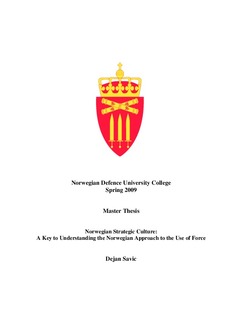| dc.description.abstract | The concept of strategic culture has as its point of departure the fact that despite having many options for strategic policies, states consistently seem to prefer a certain type of policy. The way that the decision-makers’ perceptions on the use of force shape the formulation of security policy, remains a problem that receives the attention of scholars of international relations and strategic studies. This study focuses on Norwegian perspectives on the use of force and strategic preferences based on current political and military perspectives on the use of force in Norway, providing the answer on the main question of the thesis: Which strategic perceptions and preferences for the Norwegian security policy can provide an understanding of the current Norwegian strategic culture and approach for the use of force? This thesis is built on an existing study of strategic culture written by Kerry Longhurst, whose concept is further refined for this thesis. The framework for analysis is developed by coupling the study by Longhurst with a study by Barry Buzan on the security of the state in order to find a research model adjusted for the empirical analysis of strategic culture in Norway. This way of applying the concept of strategic culture enables close insight into strategic considerations of the Norwegian political and military elite as referents of strategic culture. Focusing on a comparison of the considerations and perceptions of the political and military elite, my claim is that the Norwegian strategic culture lacks coherence. I concluded that there are two substantially different strategic cultures exist among political and military elites in Norway. In this thesis it is argued that deployment of Norwegian forces within the framework of international operations and the strengthening of multilateralism is likely to continue to have a decisive impact on the thinking on the use of force within the Norwegian political and military elite. However, when deciding on priorities within the security and defence policy, contradictory influence may to a certain extent appear. Different preferences for the use of force between the two elites lead to a concern that one of these two considerations may significantly prevail. What would be the result if the priorities and perceptions of one of these two sides are not considered to the extent expected? | en_US |
